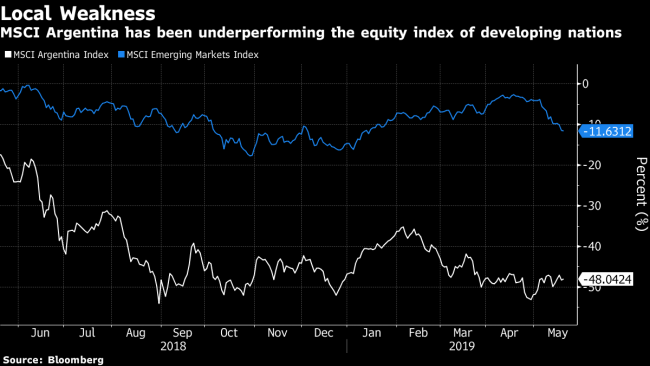(Bloomberg) -- When it comes to Latin America, BlackRock Inc (NYSE:BLK). favors Brazilian and Argentinian stocks.
“We see both markets and currencies trading at very cheap levels," said Ed Kuczma, BlackRock’s portfolio manager, who oversees $1.9 billion in the company’s Latin American equity funds. “The weakness we’re seeing right now creates long-term opportunities, as companies will take advantage of the weak growth to right-size their operating structure,” Kuczma said by phone.
Brazil’s benchmark equity Ibovespa index has fallen 2.7% so far this month, as noise from domestic politics has added to weaker-than-expected economic growth. “Between now and the pension reform’s approval, there should be volatility,” Kuczma said. “And we’re looking for opportunities to increase the overweight in Brazil.”
BlackRock expects a positive outcome for the social security reform, seeing final savings from the bill totaling between 500-700 billion reais in ten years. It also sees the reform’s approval by Brazil’s lower house taking place in last quarter of the year, according to Kuczma.
“The big question in Brazil is the pension reform: the size of the savings and when it actually will be approved,” Kuczma said. “It should unlock a lot of value.”
Among Brazilian stocks, Kuczma currently favors banks -- which started to resume lending -- and homebuilders. “Homebuilders came out of a challenging period. Inflation has come down and we also saw a very strong season for launches in the first quarter,” he said. The valuation of retailers, however, is “a little stretched,” he added.
Kuczma also has a small overweight in Argentina, where he likes Information Technology companies and banks. While MSCI Argentina Index is down 0.3% this year, he expects the country’s addition to the MSCI’s equity index of developing nations to be supportive.
“With the inclusion, you’ll start to see more flows to the equity market there,” he said.
BlackRock is more neutral on Mexico, given the impact of a disappointing growth outlook on valuations. “Some investors have been hesitant to put their money to work in Mexico,” Kuczma said.

